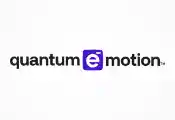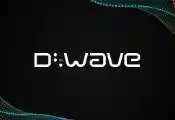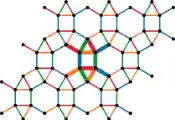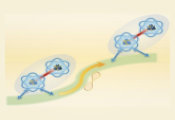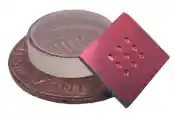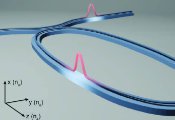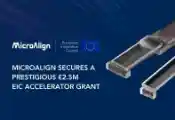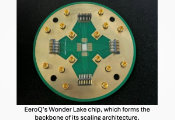URI Physics Professors Awarded Grants as Part of NSF Program to Grow Quantum Research
KINGSTON, R.I., December 04, 2024 -- Two University of Rhode Island physics professors have been awarded separate $800,000 grants as part of the National Science Foundation’s $39 million program to grow quantum research at institutions of higher education across the U.S.
The two research projects, by URI assistant professors Vanita Srinivasa and Wenchao Ge, are among 23 projects awarded nationally this year looking to advance knowledge in areas such as quantum computing, sensors and materials as part of the NSF Expanding Capacity in Quantum Information Science and Engineering (ExpandQISE) Program.
“Quantum information science and engineering promises to transform the very landscape of fundamental scientific knowledge and technological capabilities, as is recognized by the National Quantum Initiative Act and the NSF ExpandQISE program,” said Srinivasa, director of URI’s Quantum Information Science (QIS) program. “At URI, we recently launched a QIS program in research and education with the goals of expanding the National Quantum Initiative geographically to the state of Rhode Island and strengthening regional and national QIS efforts.
“We are thrilled to receive the NSF ExpandQISE grants, which will directly support our program goals by enabling regional collaboration with well-established QISE efforts and the expansion of our own efforts into the realm of quantum engineering,” she added.
“This program will give us a great boost in terms of support and attracting students and researchers to URI,” added Ge. “We received two grants from the NSF program but I think the impact will be greater than the sum of the funding.”
The NSF grants support research, training, and educational activities by developing partnerships between established quantum information science and engineering programs at research-intensive institutions and up-and-coming programs at institutions looking to build on their quantum research.
“The granting of these awards clearly indicates that URI holds the potential to become a regional hub for quantum efforts both in education and research,” said Leonard Kahn, chair of physics. “That we garnered two of these grants is remarkable and points to the ability and innovative promise of both Vanita Srinivasa and Wenchao Ge, as well as our program in general.”
URI’s grants will further stimulate collaboration with the Massachusetts Institute of Technology and the University of Delaware, which could create other partnerships, Kahn said. They will also support the growth of graduate student enrollment in quantum information science at URI because of the availability of additional research assistantships.
“While the announcement of the award of these grants is exciting, the impact on our program will be felt for many years and will change our trajectory,” Kahn said.
URI’s NSF ExpandQISE grants
Wenchao Ge: “Quantum Correlations in Quantum Approximate Optimization Algorithms and Their Implementation”
For his research, Ge will explore the fundamental theory of using hybrid quantum algorithms – those that can be run on quantum computers and today’s classical computers – to solve complex optimization problems and their implementation on near-term quantum devices, small quantum computers with a limited number of qubits. Qubits, or quantum bits, are the basic units of information in quantum computers and can process information faster than binary bits in classical computers.
Ge will have access to quantum computers from industrial partners, including IBM and QuEra, that have from 10 to 100 qubits. Ge will also leverage the collaboration with professor Ilya Safro of the University of Delaware to establish research in quantum algorithms at URI.
“The most important thing we are trying to understand is if the algorithms provide an advantage over using a classical computer,” said Ge, the principal investigator on the grant. “We are working in the era of near-term quantum computers. The devices are not perfect. But the problems they model can still be very complex to simulate on a classical computer.”
A goal of the study is to understand the role of quantum entanglement in these algorithms, Ge said. Entanglement is a phenomenon in quantum physics in which two or more particles become connected and cannot be described separately from the state of other particles. It is vital in quantum information processing, yet the explicit role of quantum entanglement in hybrid quantum algorithms is elusive, Ge said.
As part of the grant, Ge will develop an introductory quantum computing course for STEM students at URI. With a large workforce needed in the field, just a few courses could help students pivot into the industry. “As professors, we should not just focus on research. We should connect with students and get them motivated and interested in this growing field,” said Ge.
Igor Gaidai, a postdoctoral student with expertise in hybrid quantum algorithms, will work with Ge on the ExpandQISE project. Ge is also looking for graduate and undergraduate students to join his research group.
Vanita Srinivasa: “Hybrid Solid-State Modular Quantum Systems”
With the NSF grant, Srinivasa will explore a topic at the heart of her research interests – understanding the control, transfer, and entanglement of quantum information within a novel hybrid quantum system that jointly harnesses the optimal features of different physical platforms to help realize the promise of quantum information science.
Achieving that promise involves overcoming the competing challenges of preserving the fragile quantum information stored within a quantum processor through sufficiently weak interactions with its external environment and rapidly manipulating the information for calculations through sufficiently strong interactions with external control fields.
“Investigations of multiple types of physical platforms for quantum processors have shown that no single platform is optimal for satisfying all of the requirements for a quantum processor, with some platforms better suited for quantum information preservation and others for rapid manipulation,” Srinivasa said. “A hybrid platform enables the best features of different systems to be combined to optimize a quantum processor as a whole.”
The NSF project will focus on developing a theoretical framework for understanding the manipulation, transfer, and entanglement of quantum states within a new type of building block of such a hybrid quantum processor. Specifically, the project will investigate hybrid quantum systems that combine two distinct types of quantum computing platforms: semiconductor devices, which work well as compact memories for storing quantum information, and superconducting circuit elements, which can be highly tailored to enable rapid quantum information control and entanglement.
Srinivasa will collaborate with the Engineering Quantum Systems experimental group of professor William D. Oliver, director of the MIT Center for Quantum Engineering and an internationally recognized pioneer in superconducting quantum devices, to implement and refine the theoretical framework developed for the new hybrid quantum systems through proof-of-principle demonstrations.
This work will advance quantum information science knowledge by bringing together state-of-the art efforts in the spin and superconducting quantum computing fields, with the goal of creating a framework for a versatile quantum information processing platform in which preserving, rapidly controlling, and entangling quantum information can be simultaneously optimized. Such a robust and flexible hybrid building block has the potential to serve as a module for building up to the larger quantum systems needed for a full-fledged quantum computer – which Srinivasa has explored in previous research.
Srinivasa will also work with the MIT Center for Quantum Engineering to enable expanded access to cutting-edge research and educational opportunities in quantum information science and engineering for students and young scientists of diverse backgrounds.
“Currently, URI’s QIS program focuses on theoretical research. My research project will provide URI students and postdocs with new opportunities for directly engaging with the cutting-edge quantum engineering research efforts being pursued in the experimental quantum device labs at MIT,” said Srinivasa. “In addition, we will integrate the knowledge that we gain from studies of quantum state manipulation and entanglement within the new types of hybrid quantum systems we investigate in the project into new and existing QIS courses at URI and MIT. The research and educational partnership between URI and MIT enabled by this ExpandQISE project will enhance opportunities in the New England region and contribute to the National Quantum Initiative’s broader goal of strengthening the quantum workforce.”

